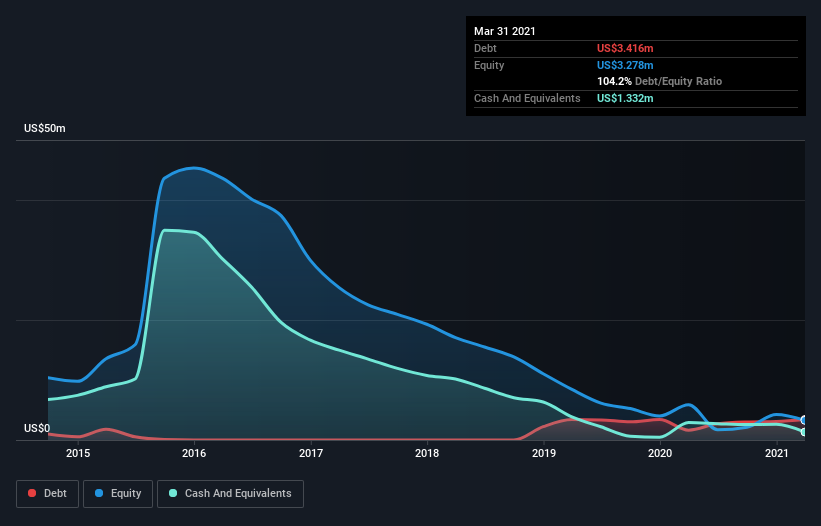- United States
- /
- Electrical
- /
- NasdaqCM:EFOI
Would Energy Focus (NASDAQ:EFOI) Be Better Off With Less Debt?

The external fund manager backed by Berkshire Hathaway's Charlie Munger, Li Lu, makes no bones about it when he says 'The biggest investment risk is not the volatility of prices, but whether you will suffer a permanent loss of capital.' So it might be obvious that you need to consider debt, when you think about how risky any given stock is, because too much debt can sink a company. As with many other companies Energy Focus, Inc. (NASDAQ:EFOI) makes use of debt. But the more important question is: how much risk is that debt creating?
When Is Debt Dangerous?
Debt is a tool to help businesses grow, but if a business is incapable of paying off its lenders, then it exists at their mercy. Ultimately, if the company can't fulfill its legal obligations to repay debt, shareholders could walk away with nothing. However, a more common (but still painful) scenario is that it has to raise new equity capital at a low price, thus permanently diluting shareholders. Of course, the upside of debt is that it often represents cheap capital, especially when it replaces dilution in a company with the ability to reinvest at high rates of return. When we think about a company's use of debt, we first look at cash and debt together.
Check out our latest analysis for Energy Focus
How Much Debt Does Energy Focus Carry?
As you can see below, at the end of March 2021, Energy Focus had US$3.42m of debt, up from US$1.64m a year ago. Click the image for more detail. However, it also had US$1.33m in cash, and so its net debt is US$2.08m.

How Strong Is Energy Focus' Balance Sheet?
Zooming in on the latest balance sheet data, we can see that Energy Focus had liabilities of US$8.88m due within 12 months and liabilities of US$172.0k due beyond that. Offsetting these obligations, it had cash of US$1.33m as well as receivables valued at US$1.49m due within 12 months. So its liabilities total US$6.23m more than the combination of its cash and short-term receivables.
While this might seem like a lot, it is not so bad since Energy Focus has a market capitalization of US$18.7m, and so it could probably strengthen its balance sheet by raising capital if it needed to. But it's clear that we should definitely closely examine whether it can manage its debt without dilution. When analysing debt levels, the balance sheet is the obvious place to start. But it is future earnings, more than anything, that will determine Energy Focus's ability to maintain a healthy balance sheet going forward. So if you're focused on the future you can check out this free report showing analyst profit forecasts.
Over 12 months, Energy Focus reported revenue of US$16m, which is a gain of 18%, although it did not report any earnings before interest and tax. We usually like to see faster growth from unprofitable companies, but each to their own.
Caveat Emptor
Over the last twelve months Energy Focus produced an earnings before interest and tax (EBIT) loss. Indeed, it lost a very considerable US$5.2m at the EBIT level. When we look at that and recall the liabilities on its balance sheet, relative to cash, it seems unwise to us for the company to have any debt. So we think its balance sheet is a little strained, though not beyond repair. However, it doesn't help that it burned through US$6.0m of cash over the last year. So suffice it to say we consider the stock very risky. The balance sheet is clearly the area to focus on when you are analysing debt. However, not all investment risk resides within the balance sheet - far from it. These risks can be hard to spot. Every company has them, and we've spotted 5 warning signs for Energy Focus (of which 2 are significant!) you should know about.
At the end of the day, it's often better to focus on companies that are free from net debt. You can access our special list of such companies (all with a track record of profit growth). It's free.
When trading Energy Focus or any other investment, use the platform considered by many to be the Professional's Gateway to the Worlds Market, Interactive Brokers. You get the lowest-cost* trading on stocks, options, futures, forex, bonds and funds worldwide from a single integrated account. Promoted
Valuation is complex, but we're here to simplify it.
Discover if Energy Focus might be undervalued or overvalued with our detailed analysis, featuring fair value estimates, potential risks, dividends, insider trades, and its financial condition.
Access Free AnalysisThis article by Simply Wall St is general in nature. It does not constitute a recommendation to buy or sell any stock, and does not take account of your objectives, or your financial situation. We aim to bring you long-term focused analysis driven by fundamental data. Note that our analysis may not factor in the latest price-sensitive company announcements or qualitative material. Simply Wall St has no position in any stocks mentioned.
*Interactive Brokers Rated Lowest Cost Broker by StockBrokers.com Annual Online Review 2020
Have feedback on this article? Concerned about the content? Get in touch with us directly. Alternatively, email editorial-team (at) simplywallst.com.
About NasdaqCM:EFOI
Energy Focus
Designs, develops, manufactures, markets, and sells energy-efficient lighting systems, and controls and ultraviolet-C light disinfection products in the United States and internationally.
Excellent balance sheet low.
Similar Companies
Market Insights
Community Narratives




